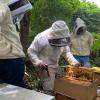Grenada National Ecosystem Assessment: Linking Science and Policy (2020)
Known as the “Spice Isle”, Grenada’s very identity is connected to the biodiversity and ecosystem services provided by its diverse natural capital. The country’s rich and biodiverse ecosystems underpin critical economic sectors such as tourism, fisheries and agriculture. At the same time, its ecosystems and biodiversity face a number of pressures and drivers of change, that jeopardise the health of the country’s economy, environment and people.
The Grenada National Ecosystem Assessment (NEA) aims to form an essential knowledge base for the safeguarding of essential biodiversity and ecosystem services that underpin national well-being. This report outlines the critical scoping phase of the assessment, which in preparation for the compilation of the main report, outlines the assessment’s scope, priorities, and proposed methodology for execution.
As an independent small island developing state, Grenada faces numerous challenges due to its high vulnerability to climate change related impacts and its susceptibility to global economic shocks. While it is one of many small island developing states, it is the first one conducting an NEA under the guidance of Intergovernmental Platform on Biodiversity and Ecosystem Services (IPBES) and the United Nations Environment Programme-World Conservation Monitoring Centre (UNEP-WCMC) as part of a commitment to a sustainable development pathway. As such, this NEA will produce information and showcase methodologies that can be used to support future NEAs across other island states and states with similar geographies and environmental and economic challenges. The assessment team and Government of Grenada hope to set a regional and global example of how to conduct NEAs within this context, through the mainstreaming of Grenada’s NEA learnings into governance, policy, decisions and way of life.
Area of interest: Grenada
Year: 2020




